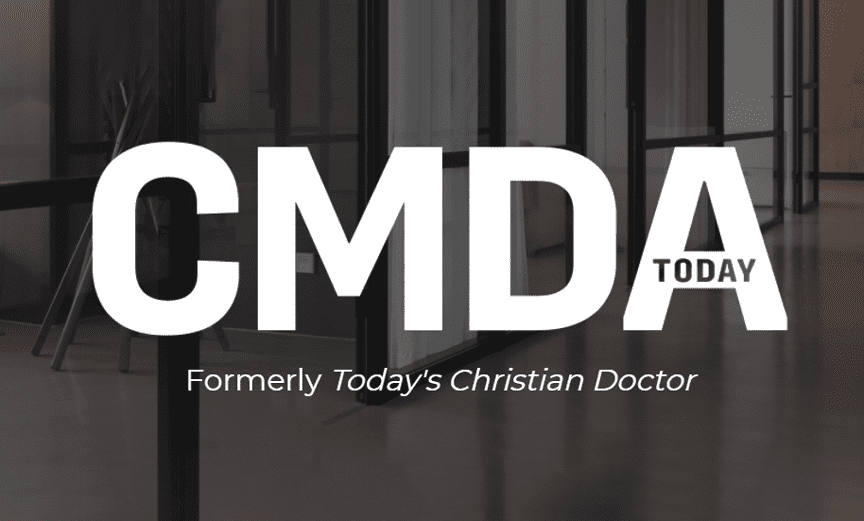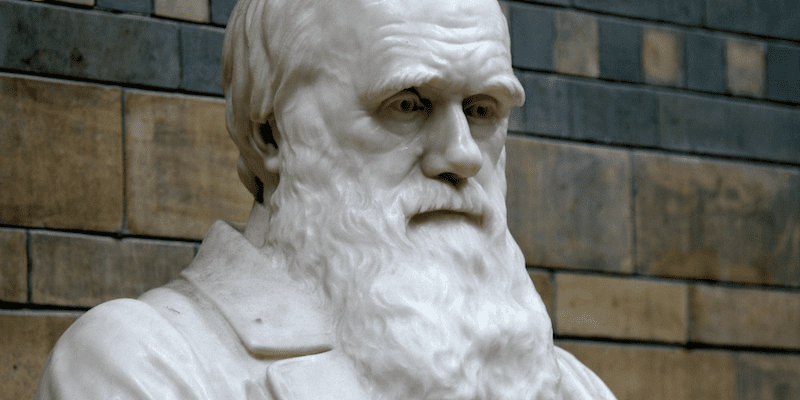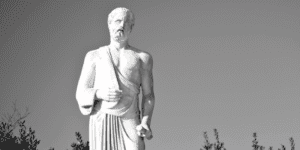
What Foundation Do Ideas of Ethics Have if Darwin is Right?
Charles Darwin’s great idea was that biological change could be endless if small, beneficial, naturally occurring variations could be selectively preserved and grow because of initially small survival advantages. He provided no theory of beginnings, only of process, which did not concern him too much because Aristotle’s belief in the eternity of matter had not been disproved. Furthermore, micro-evolution occurs all the time as Darwin describes so beautifully in the first chapter of On the Origin of Species.

by John Patrick, MD
Charles Darwin’s great idea was that biological change could be endless if small, beneficial, naturally occurring variations could be selectively preserved and grow because of initially small survival advantages. He provided no theory of beginnings, only of process, which did not concern him too much because Aristotle’s belief in the eternity of matter had not been disproved. Furthermore, micro-evolution occurs all the time as Darwin describes so beautifully in the first chapter of On the Origin of Species. Healthcare professionals see patients every year with diseases like influenza, but no major alterations in body plans have been conclusively shown to have emerged from other groups. Most importantly, science only describes, it does not prescribe. The moral and cultural norms of society have no necessary individual benefits. Whence cometh human characteristics like fighting to preserve the lives of others at the cost of our own? There is no genetic benefit from young men who die before reproducing. No patriotic gene would survive.
We cannot flourish without societies that have a moral consensus—and one that recognizes our duties to one another regardless of ourselves.
That consensus in the Western world was derived from Judeo-Christian sources, and it can be argued that they served us well, but they are now decaying rapidly. The rise of bioethics implicitly acknowledges that past but does not revere it. Medical ethics were not taught in my medical school. Basic principles were transmitted by our families before we could think abstractly, and they were mirrored and adjusted to the practice of medicine by our teachers, not didactically but implicitly. Good manners were expected, but they were mingled with much hypocrisy and were utterly unable to confront the rise of godless autonomy and Darwinian each against each.
When otherwise unemployable philosophers turned medical ethics into bioethics, they did not clarify problems but rather developed an industry of rationally defending the counter-positions to our culturally created norms. For example, never killing patients or keeping sexual activity only within marriage (incidentally, there is a good case to be made that sex confined to marriage increases creativity in business and science). The first thing that had to be done was to quietly suppress the question: In the beginning what or whom and allow the muttering of big bang to pass for an argument. Bioethics in medicine uses the Georgetown Mantra[1] as a pseudo-foundation, which shirks not only the question of beginnings but also the question of where the authority to enforce their pontifications is to be found. Some items to ponder:
- Who, in the secular world, judges the elite?
- If all truth is personal, then there is no logic. The idea that all truth is relative dies when it meets the question—“Including that statement?”
- The post-modern response is to say only power matters.
- We are all liars or cowards.
- The parable of the wicked tenants.
- The modern story of my desires.
- The whole passion week story is about the denial of the truth of who Jesus is.
- Polytheistic pagans like Aristotle spent their lives on the question of how to live well and virtue was their answer, but their primary virtues were courage, justice, prudence and temperance. They did not include women, slaves or the poor in their democratic processes.
- We allow bioethicists to control our world without resistance. They encourage everyone to attend only to DIE: diversity, inclusion and equality (never adequately discussed and developed), although they know there are far more weighty principles needing attention.
- Really smart academics are beginning to say that we live in a society without adequate foundations that science only describes and cannot generate values—a weasel word if ever there was one.
- There is hope, but it requires renewed minds to flourish.
This list requires development. I would appreciate feedback from readers as to which items intrigue them most. On this occasion, I will only have space for four to seven which are my meditations on what I learned about reading the parable of the wicked husbandmen in my current favorite book—John Webster’s Confronted by Grace: Meditations of a Theologian.[2]
First, I had neglected to note that the parable is told toward the end of Jesus’ final journey to Jerusalem and, although the rulers of the Jews are the obvious targets, Webster convincingly shows that we are all guilty of the fundamental sin of wanting to make the world fit our desires rather than practice true obedience to the Lord. The wicked husbandmen wanted the vineyard for themselves, so they set about destroying any other claimants. The Lord has purchased our otherwise self-centered lives and remitted our sins for which I trust we are all duly grateful. However, remember the washing of the disciples’ feet where Jesus draws out this conclusion: “You call me Teacher and Lord and rightly so, for that is who I am. Now that I, your Lord and Teacher, have washed your feet, you also should wash one another’s feet” (John 13:13-14). It is a terrifying challenge. We all lie about the truth that he is Lord.
Here is Webster’s superb paragraph on why we lie: “Why do we tell lies? We lie to evade reality; we lie because the truth is too painful or too shameful for us to face, or because the truth is simply inconvenient and must be suppressed before it’s allowed to disturb us. We invent lies because for whatever reason, we want to invent reality. [The reality we invent] makes no claims on us. It demands nothing. It doesn’t shape us the way truth shapes us… A lie is a made-up reality and so never unsettles, never criticizes, never resists, never overthrows us. It’s the world not as it is, but as we wish it to be, a world organized around us and our desires, the perfect environment in which we can be left in peace to be ourselves. (How modern this is, but from a 1999 sermon.)
He continues, “Lies are a desperately destructive force in human life. When they take the form of private fantasy, they rob us of the ability to deal truthfully with the outside world but when they go public, when an entire social group replaces reality with untruth, then the consequences are deadly. Lies can kill. If the lie is to be maintained intact, then anything that speaks the truth must be got rid of.”
If that doesn’t sound familiar you have been asleep for quite some time!
[1] https://en.wikipedia.org/wiki/Principlism
[2] Webster, John. (2015). Confronted by Grace: Meditations of a Theologian. Lexham Press.
This Feature Story Appears in:
Other Recent CMDA Today Articles:
- « Previous
- 1
- …
- 3
- 4
- 5




